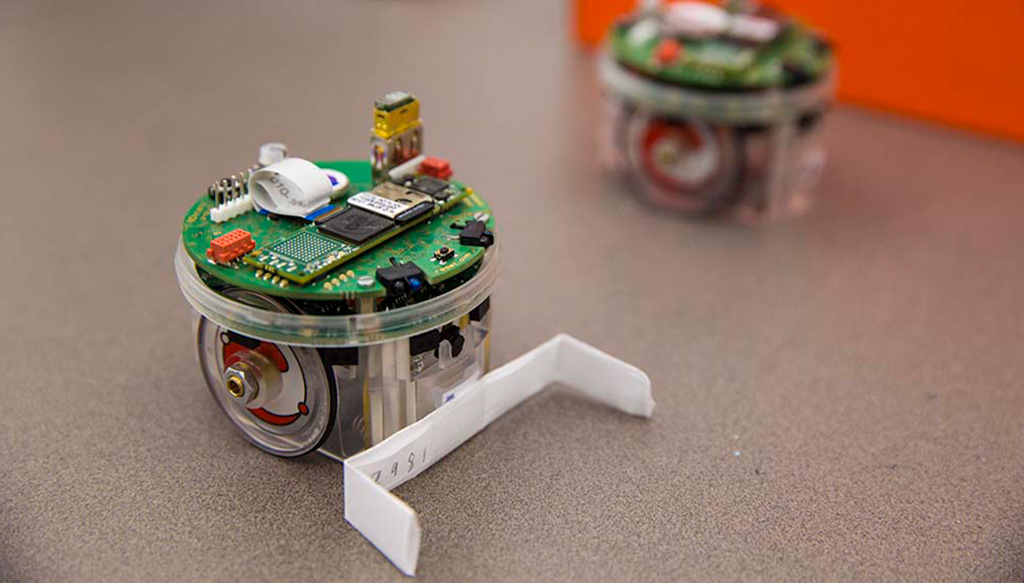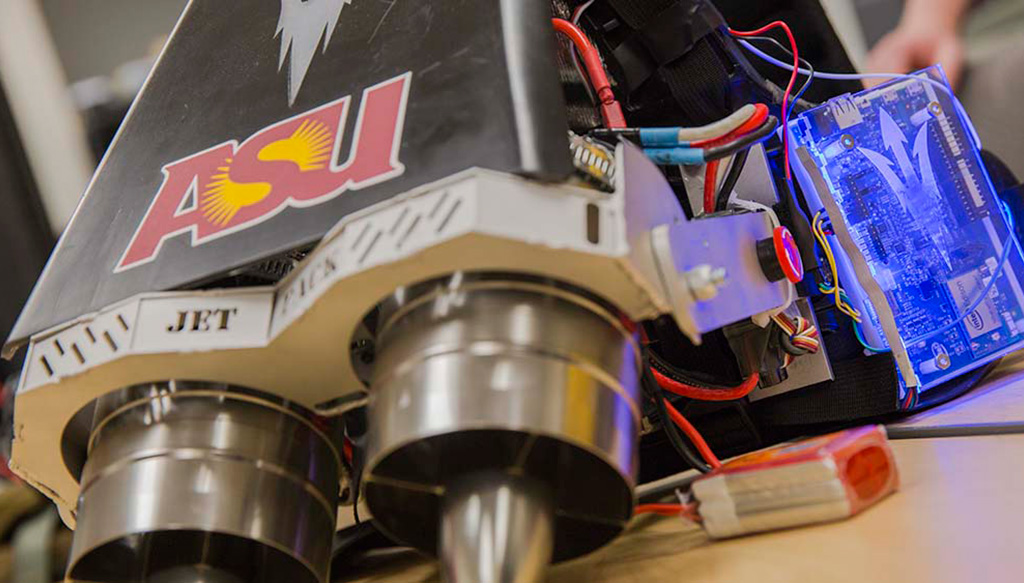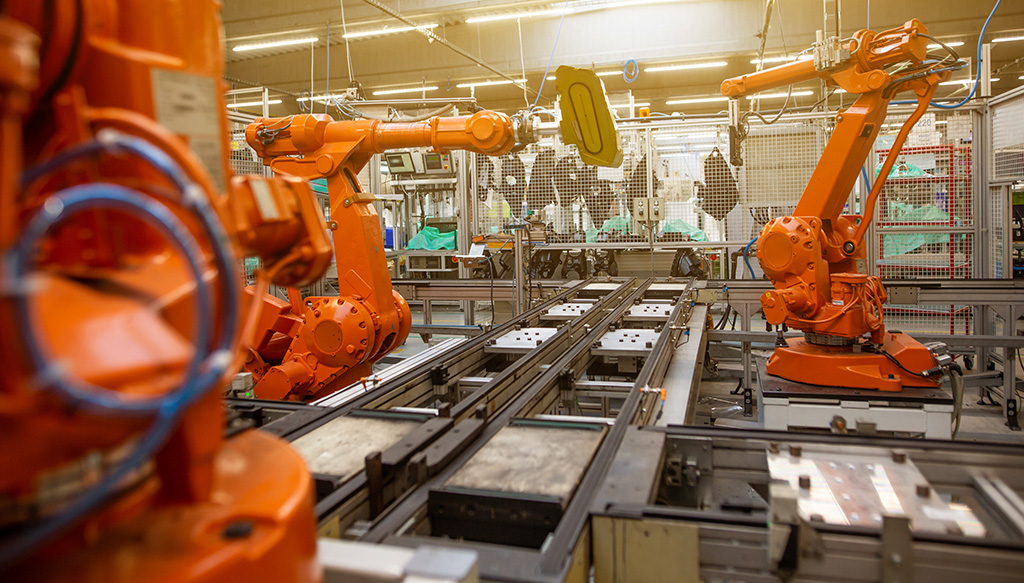
Degree concentrations
All concentrations prepare engineers for doctoral degree studies or industrial positions that specialize in research, project management and product innovation related to robotics and autonomous systems. Modern robotics and autonomous systems laboratory facilities are available to support research investigations.
Artificial intelligence concentration
This concentration is offered by the School of Computing and Augmented Intelligence (SCAI) at the Tempe campus. It is appropriate for students who wish to have a career in robotics and autonomous systems emphasizing applications in artificial intelligence and computer science.
Students will receive a solid theoretical and practical background in a variety of topics that facilitate the study of “intelligent agents,” which are any robotic systems that perceive an environment and take actions that maximize the chance of successfully achieving the systems’ goals. Students in this concentration will be exposed to the frontiers of the general topics in AI, including statistical machine learning, computer vision, natural language processing, knowledge retrieval and reasoning and formal methods of planning. The AI concentration focuses more on the algorithmic aspects of robotics than the other available concentrations.
Students applying to the artificial intelligence concentration are expected to possess basic knowledge in key relevant areas, e.g. programming languages, discrete mathematics and data structures and algorithms or similar topics. ASU courses on these topics include CSE 220 or 240, MAT 243 or 300 and CSE 310.
Biomedical engineering concentration
This concentration is offered by the School of Biological and Health Systems Engineering at the Tempe and Polytechnic campuses. It is appropriate for students who want to pursue a career emphasizing applications in biomedical engineering. Biomedical engineers work at the interface of technology and medicine on challenges critical to the advancement of health and scientific discovery.
Electrical engineering concentration
This concentration is offered by the School of Electrical, Computer and Energy Engineering at the Tempe campus. It is appropriate for students who wish to pursue a career emphasizing applications in electrical engineering.
Students will receive a solid theoretical and practical background in a variety of topics, including theory, design and implementation of control systems, signal processing, real-time and embedded systems, computer vision and machine learning. Students in this concentration will be exposed to state-of-the-art and emerging theories and implementations related to sensing, data processing, adaptive control, automated mobility, autonomous systems, human-machine interaction and robotic applications in various domains such as public safety, manufacturing, health care, automotive and assistive technologies.
Students applying to the electrical engineering concentration are expected to possess basic knowledge in key relevant areas, e.g. signals and systems, feedback and controls, computer architecture and organization, embedded systems, random signal analysis and programming (preferably C or similar language, MATLAB-Simulink-toolboxes) or similar topics. ASU courses in these areas include EEE 203, EEE 230, EEE 350, CSE 220, EEE 480 and EEE 481.
Mechanical and aerospace engineering concentration
This concentration is offered by the School for Engineering of Matter, Transport and Energy at the Tempe campus. It is appropriate for students who wish to pursue a career emphasizing applications in mechanical or aerospace engineering. The program provides students with the necessary background and skills for a broad range of robotics and autonomous systems applications.
Students will get a solid theoretical and practical background in a variety of topics that include theory, design and implementation of control systems, kinematics and dynamics of rigid and non-rigid (flexible and soft) robotic systems, design and bioinspiration in controller design and hardware, swarm robotics and embedded systems programming.
Most importantly, students in this concentration will be exposed to state-of-the-art and emerging theories and implementations related to human-robot interaction, robotics and automation in health care, manufacturing, automotive controls and a plethora of everyday applications of robotics and autonomous systems.
Students applying to the mechanical and aerospace concentration are expected to possess basic knowledge in key relevant areas, e.g. kinematics, dynamics, programming in MATLAB and system dynamics and control or similar topics. ASU courses in these areas include MAE 201, MAE 202, MAE 215, MAE 318 and MAE 417.
Systems engineering concentration
This concentration is offered by the School of Manufacturing Systems and Networks at the Polytechnic campus. It is appropriate for students who wish to pursue a career emphasizing applications in systems engineering. The systems engineering concentration will prepare students to identify, model, analyze, interpret, optimize and manage the multidimensional interactions of increasingly complex modern mechatronic and robotic problems.
Subject areas include mechatronics, controls, foldable robotics, soft robotics, medical robotics, design, additive manufacturing and industrial automation.
Students applying to the systems engineering concentration are expected to possess basic knowledge in key relevant areas, e.g. feedback and controls, embedded systems, programming (preferably C or similar language, MATLAB-Simulink-toolboxes) and dynamics or similar topics. ASU courses in this area include EGR 219, EGR 455, EGR 456, EGR 433 and PHY 321.




